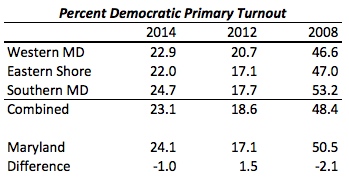Much debate swirls around police brutality in Baltimore and the peaceful protests then riots following Freddie Gray’s death but little discussion has taken place about the political impact of these events. Today’s post focuses on that question.
Put bluntly, it puts the squeeze on Democrats.
In the struggle over public opinion regarding police actions, many voters tend to give the police the benefit of the doubt as they value law and order and respect that it’s a tough and often dangerous job. That bias can be overcome, as in New York, if protests stay peaceful and the police overplay their hand.
In Maryland, however, the Baltimore riots are likely to hurt the Democrats among the swingy white voters who elected Gov. Larry Hogan and helped the Republicans to take the Senate nationally. Remember that the events in Ferguson were in the spotlight just before the 2014 elections.
And the effect may not be limited to whites. There is no guarantee that Maryland’s Latino and Asian voters will not be more concerned about public safety than police brutality. People of color are not a political or social monolith.
Messages that Won’t Work
Unsurprisingly, people have strong views on the police, race, and many related issues. However, some of these viewpoints have the potential to harm Democrats greatly. Critically, I emphasize that the point here is not whether the views are right or wrong but that seem likely to me to have a sharp negative political impact.
Arguments that these problems all stem from racism will only exacerbate Democratic political problems. Nobody likes being accused of being a racist–an excellent way to alienate voters appalled by the riots. Moreover, they know some of the police involved in Freddie Gray’s death are African American, as is the police chief and mayor.
Similarly, efforts to label the riots an “uprising” will strike the same voters as hopelessly out of touch (read: insane). Quotes from Democrats that appear to justify violence, like Del. Maricé Morales’ Facebook post, will be used against Democrats.
The sharp spike in the murder rate in the wake of the riots will only increase the demand for law and order. Many of the victims are African American. Charnice Milton, a promising young journalist with a moving personal story, was shot to death just a few days ago in Washington, DC when she got caught in gang crossfire responsible for many recent killings in Baltimore.
Blaming chronic neglect of the poorest parts of Baltimore won’t work either. After sixteen years of William Donald Schaefer and Martin O’Malley as Governor, it’s a hard sell that the State has not sent sufficient cash Baltimore’s way.
It doesn’t matter whether these points are correct so much as this is how many swing voters will perceive it. It’s their views that shape their votes–not how you think they should see events.
Crafting a Democratic Message
Getting a grip on this tough issue politically is going to require a clear message that doesn’t sound hedging yet addresses the very legitimate concerns of the party’s oft-divided constituencies. Borrowing a version of Tony Blair’s “tough on crime, tough on the causes of crime” slogan from the 1990s might fit the bill.
Criminal behavior is unacceptable. Full stop. The recent riots stole jobs from working people and burned down housing being built by local leaders for the elderly. Violence eats at the fabric of already struggling communities.
For exactly these reasons, we need stronger policing policies that protect the rights and dignity of citizens as well as the police. We need to do it not only because it’s right but because our communities will be safer for it. Mutual lack of trust and hostility between the police and the community is a direct threat to public safety.
Crises provide opportunities for leaders. These are tough problems but addressing them can advance the party’s strong commitment to justice and to public safety. Articulating a strong message supporting both is critical to preserving public trust.
It’s more complicated that straightforward condemnations of either criminal behavior or police brutality. Fortunately, there are signs of some Democrats leading the way. See the Facebook comments by Del. Brooke Lierman (and the other legislators from D46) as well as Del. David Moon’s call to end the damaging drug war.
 For purposes of this table, Western Maryland includes Garrett, Allegany, Washington, Frederick and Carroll Counties. Southern Maryland is Calvert, Charles, and St. Mary’s Counties. The Eastern Shore includes the nine counties east of the Bay. (Of course, these counties also include some urban and suburban areas.)
For purposes of this table, Western Maryland includes Garrett, Allegany, Washington, Frederick and Carroll Counties. Southern Maryland is Calvert, Charles, and St. Mary’s Counties. The Eastern Shore includes the nine counties east of the Bay. (Of course, these counties also include some urban and suburban areas.) The difference hasn’t varied that much regardless of the overall level of turnout. However, the 2012 results suggest that, perhaps, rural voters are slightly less likely to stay away in low turnout contests. In that race, rural turnout exceeded the rest of the State by 1.5%. In contrast, rural Democratic primary turnout was lower than the State as a whole in the higher turnout 2008 and 2014 primaries.
The difference hasn’t varied that much regardless of the overall level of turnout. However, the 2012 results suggest that, perhaps, rural voters are slightly less likely to stay away in low turnout contests. In that race, rural turnout exceeded the rest of the State by 1.5%. In contrast, rural Democratic primary turnout was lower than the State as a whole in the higher turnout 2008 and 2014 primaries.